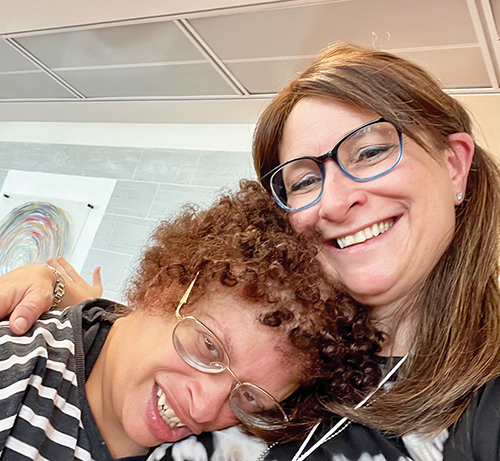Dr. Erica Brown shares her experiences with The Jewish Link.

Since Oct. 7, when Hamas brutally attacked Israel, more than 1,400 Israelis were killed. Thousands more have been injured, and more than 240 have been abducted into Gaza and are being held hostage. Currently, millions of Israelis remain in harm’s way due to the relentless barrage of rockets or because they are fighting on the front lines for Israel. Aside from physical danger, Israelis continue to be impacted by the war with Hamas in countless ways. Israel is now in what is called a state of emergency routine. It is crucial that our brothers and sisters in Israel know that American Jewry stands in solidarity with Israel.
UJA-Federation of New York (UJA) has been mobilizing since the war began, providing critical financial aid to victims and their families. Since Oct. 7, UJA has allocated more than $37 million to meet emergency needs related to the war.
Additionally, from Oct. 31-Nov. 1, UJA led a coalition of 28 local rabbis and Jewish leaders from diverse backgrounds to Israel. This emergency delegation visited numerous communities, providing support and trauma assistance to evacuees and families of hostages, and engaging in chaplaincy work at major hospitals. Synagogues and organizations from the five boroughs of New York City as well as Long Island and Westchester were represented.
Dr. Erica Brown, the vice provost for values and leadership at Yeshiva University and the director of its Rabbi Lord Jonathan Sacks-Herenstein Center for Values and Leadership and the author or co-author of 15 books on leadership, spirituality and the Hebrew Bible, was one of the Jewish leaders joining this emergency delegation.
Dr. Brown shared her thoughts on this mission with The Jewish Link.
“I could say [that I went] because as a Jewish educator, the centrality of Israel is foundational to my teaching. Or I could respond that in my role at Yeshiva University, I help plan relief missions and wanted to scout out opportunities for our students to volunteer over winter break. And although that is true, the real reason is that I am a Jew and when other Jews are suffering, I must stand beside them in that suffering.

“I was hoping to grieve with hostage families and visit evacuees who lost friends and relatives,” added Dr. Brown. “I thought we might attend a funeral and pay respects to those who have made the ultimate sacrifice. I wanted to learn about the many wonderful organizations that UJA-Federation of New York funds and the aid they are providing. I was blessed to do all of that and more in just 48 hours. What I saw everywhere was an immense outpouring of altruism, which is the most meaningful Jewish response to the barbarity of October 7th. We match hate with love and light.
“It’s hard to describe the intensity of emotion walking into the lobby of a hotel in the Dead Sea area that is housing most of the evacuated members of Kibbutz Be’eri and see yahrzeit candles in the memorial area they created for those who died on October 7th and all the photos of their hostages,” she continued. “You felt a gut punch when a kibbutz member asked what any of us would do if 90 people we knew and cared about died on the same day and 30 were kidnapped? Every person is a universe. Every story must be told and honored. The numbers are unfathomable.”
Dr. Brown noted, “The American Jewish community, particularly on college campuses today, is afraid. Basic assumptions about their safety and security have been profoundly challenged. Israelis learned to manage that fear long ago and respond with giving, caring and compassion to the vulnerable around them. Right now we all feel so vulnerable and it has become a kind of societal glue that reminds us we really are one. We need to hold tight to that feeling so we can enjoy it on better days.
“As the war progresses, it’s especially important to continue to protest, to give charity, and to keep in touch with Israeli friends and relatives daily,” she emphasized. “Over time, the intensity of our efforts wanes. We cannot let that happen because members of our family are still kidnapped. We cannot return to normal life if they can’t return to normal life.”
Further information on UJA’s emergency work in Israel and grantmaking can be found here: www.ujafedny.org/israel-at-war.
Susan R. Eisenstein is a longtime Jewish educator, passionate about creating special, innovative activities for her students. She is also passionate about writing about Jewish topics and about Israel. She has two master’s degrees and a doctorate in education from Columbia University.












